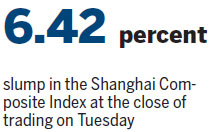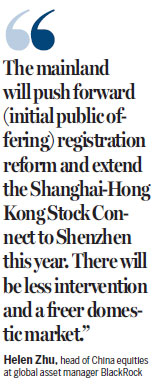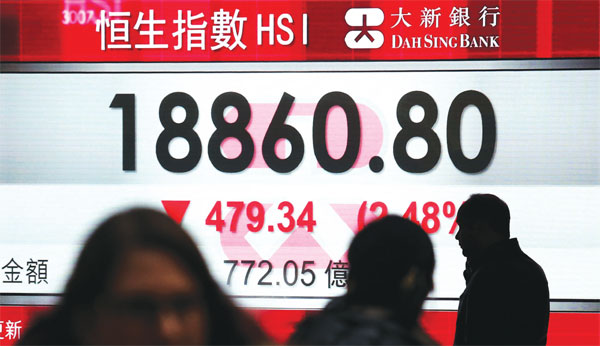Hong Kong, mainland markets take a beating
Updated: 2016-01-27 08:06
By Emma Dai in Hong Kong(HK Edition)
|
|||||||||
|
Taking the cue from sliding mainland stock market, the Hang Seng Index closed 2.48 percent lower on Tuesday. Experts estimate that the local stock market will be in for a more volatile year in 2016. Provided to China Daily |
Disappointment over PBOC's 440b yuan injection into money market, Wall Street slide batter sentiment
Stock markets tumbled on the Chinese mainland and in Hong Kong on Tuesday as investors reacted with disappointment to a 440-billion-yuan injection into the money market by the nation's central bank aimed at easing tight liquidity ahead of next month's Spring Festival.
Other regional markets also had a bashing, exacerbated by worries about the mainland's slowed economy, as well as heavy overnight losses on Wall Street as oil prices continued their descent.
Analysts have warned of further downward pressure on equity markets as risk fears grow among domestic investors, coupled with external headwinds.

The Shanghai Composite Index plummeted 6.42 percent, or 188.73 points, to close at 2,749.79 - a 13-month low since it reached 2,683 at the end of November 2014. The benchmark has tumbled 22.3 percent so far this year.
The Shenzhen Composite Index also took a beating, diving 7.1 percent to 1,724.
Hong Kong's benchmark Hang Seng Index (HSI) shed 2.48 percent, or 479.34 points, to 18,860.8, while the Hang Seng China Enterprises Index slid 3.4 percent to 7,895.16.
The People's Bank of China (PBOC) on Tuesday injected 80 billion yuan ($12.1 billion) into domestic money markets through seven-day reverse bond repurchase agreements (reverse-repos), and another 360 billion yuan through 28-day reverse-repos.
The total injection was the largest made in a single day since February 2013. Interest rates were left unchanged at 2.25 percent and 2.6 percent for seven-day and 28-day contracts, respectively.
But, the short-term easing measure came as rather disappointing to the market, crushing expectations that the central bank may lower banks' required reserve ratios (RRR) before the Spring Festival, which falls on Feb 8, said Hong Hao, chief China strategist at BOCOM International.
"This is too strong a signal that the PBOC has been very cautious about monetary easing. With this 440-billion yuan open market operation, it's almost impossible for another RRR cut before the Chinese New Year holidays," he said.
In an earlier report, Hong forecast that the Shanghai gauge would fluctuate around 2,900 points - a level at which stock earnings yield and 10-year US Treasury bond yields would reach equilibrium. He expected the index to hit 2,500 at some point this year given that investors have been risk-off and flooding into fixed-income assets.

Helen Zhu, head of China equities at global asset manager BlackRock, believes that the "national team" will intervene in the market less frequently in 2016 than last year.
"The authorities' priority has shifted from rescuing the market to normalizing it," Zhu said on Tuesday.
"The mainland will push forward IPO (initial public offering) registration reform and extend the Shanghai-Hong Kong Stock Connect to Shenzhen this year. There will be less intervention and a freer domestic market," she said.
Zhu explained that while the authorities had to intervene during the market collapse last July due to high leverage rates and a potential spillover effect challenging the stability of the entire financial system, the systemic risk of a market downturn has now declined significantly provided margin finance activities are largely put under control.
Alicia Garcia Herrero, chief economist for Asia Pacific at French investment bank Natixis, said the HSI is expected to be more volatile this year.
Calling Hong Kong a "mirror market" for the mainland, with free capital account convertibility, Herrero said the city is the easiest short selling tool for mainland bears, whereas mainland-listed stocks are far out of their reach.
"Fluctuation in the offshore yuan market is also very disruptive to the HSI," said Hong. "The recent weakening of the yuan has driven the local market down a lot. And this is only going to get fiercer."
emmadai@chinadailyhk.com
(HK Edition 01/27/2016 page8)
